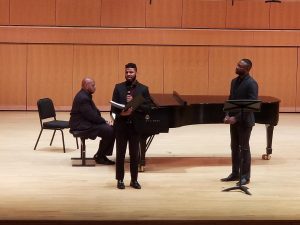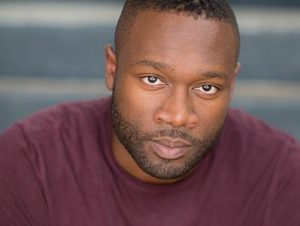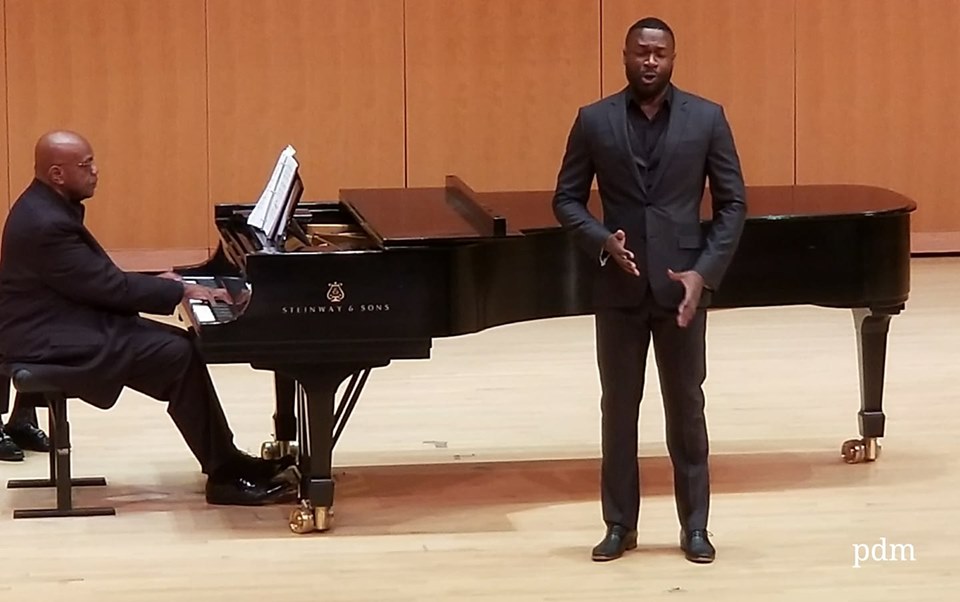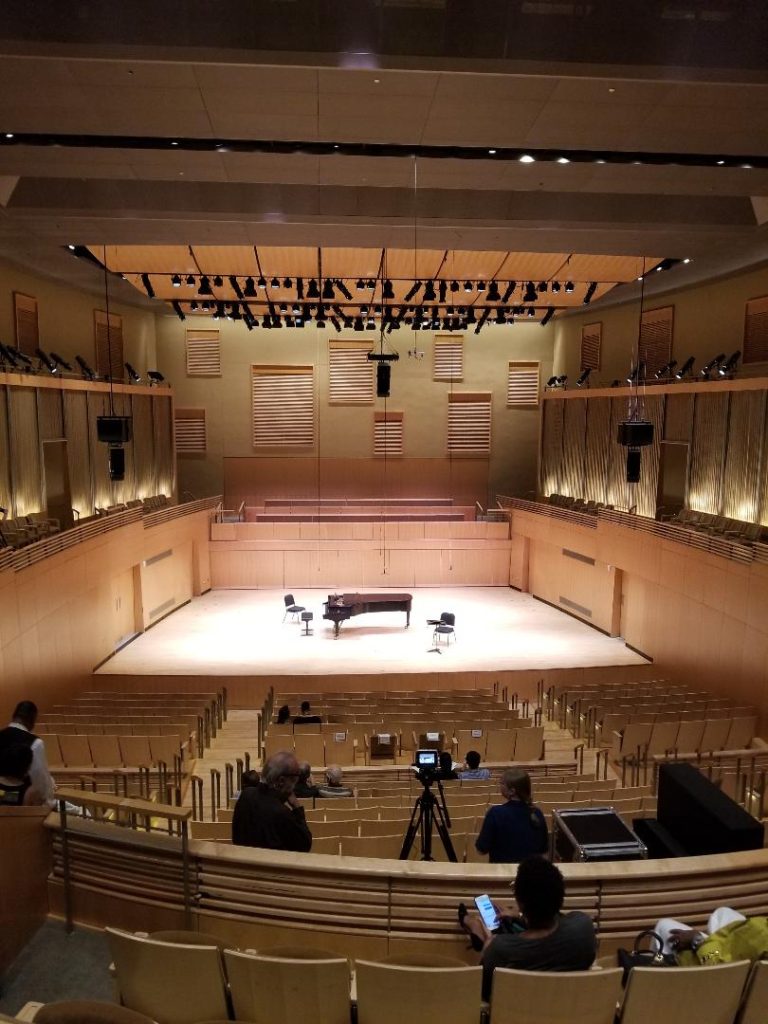SENDING A MESSAGE: Introducing some standards and new works by African-composers, bass-baritone Carl DuPont presented a rich vocal recital underscored by thought provoking narration.
by Patrick D. McCoy
Founded by concert pianist Asiya Korepanova, Festival Baltimore is a relatively new classical music festival hosted at the University of Maryland-Baltimore County’s (UMBC) impressive Linehan Concert Hall. Offering a variety of recitals featuring the violin, piano and chamber music, the recital series offered a unique program of repertoire by African-American composers, including spirituals, art songs and original works on Wednesday night.
Many of today’s artists are using their performances as a platform to speak to current events. Bass-baritone Carl DuPont’s recital was no exception as he presented a program which interpolated moving narrations that captured the African-American experience. With the theme “The Reaction” not only did the listener have the opportunity to be introduced or reacquainted with this repertoire, but also a moment to reflect at a deeper level as the music was being performed. There is a personal choice, a give or take that the artist has to consider. Either the focus is going to be to introduce to the audience to a new piece of music or to use something that is unfamiliar to intimate an all familiar topic. Overall, this recital format was engaging and was creative not only in its musical content, but in its boldness in using the performance as a vehicle for conversation. Accompanied by pianist Gregory Thompson, DuPont was also joined by Roderick Demmings who served as narrator.
A talented musician himself, Demmings read intermingled narrations (including excerpts

Roderick Demmings (center) served as .narrator for the recital Pianist Gregory Thompson is seated at the piano.
by Ta-Nehisi Coates, Mary McLeod Bethune, Julius Lester and Claudia Rankine) with great nuance that gave feeling to the musical events that preceded or followed. There was not a printed program, but the audience was invited to access the evening’s program on DuPont’s website or on his Instagram account. At first with a hint of reservation from this writer, this introduced the wave of where concerts are going and the possibility of bringing in younger audiences with this use of social media in the recital setting.
The program opened with the beloved spiritual “Deep River” arranged by H. T. Burleigh. DuPont sang sensitively, drawing the listener into this reflective spiritual. In “I Want Jesus to Walk with Me” the march-like accompaniment articulated by pianist Gregory Thompson worked in tandem to the fervor of the singer’s interpretation of devotion. “Witness” by Hall Johnson was performed like a musical narrative, with the engagement of the voice with the piano accompaniment and thus ‘speaking’ to the audience. “Song to the Dark Virgin” by Florence Price was rendered with long legato lines, delicately supported by the pianist’s accompaniment.
Of the readings that were presented, what was interesting was the inclusion of Maya Angelou’s iconic poem “Still I Rise.” Traditionally a work that evokes the strength, presence and perception of the black woman in our culture, it was interesting to hear it offered in the tenor of the male voice by Demmings. There were many interpretations that one could come to, but the universal spirit of affirmation, acceptance and redemption perhaps first come to mind.

Bass-baritone Carl DuPont is an accomplished recitalist and teacher currently serving on the faculty at Peabody.
Aside from the standard repertoire, there were some fresh pieces that stood out. “The Reaction” for which the program was themed was an a cappella declaration, repeating the probing question “Can’t we do something.” The composer of the provocative work Matthew Evan Taylor was present in the audience. Suprisingly, the jewel of the recital was a set of songs entitled “A Love Cycle” by Marques L. A. Garrett. With hints of familiar strains of Douaudy’s “O Mio Del Amato Ben” DuPont’s voice was marked by a passionate, lyric resonance that captured the sentiment of the pieces. Of the three song cycle, it was the “Herz, Mein Herz” that provided the capstone. Coupled by the warmth of the piano and the sense of restraint, DuPont not only sang with command-but also a quiet fervor.
Rounding out the recital were spirited pieces from the African-American experience, notably the classic “Oh Happy Day” in which DuPont engaged the small, but appreciative audience.
For the complete recital repertoire, CLICK HERE:
Explore the remaining concerts of the festival: CLICK HERE
A native of Petersburg, VA, Patrick holds a BM in Vocal Performance from Virginia State University and a MM in Church Music from Shenandoah Conservatory. Formerly the Performing Arts Columnist for Washington Life Magazine, he currently is a freelance writer, publishing articles for several noted publications, including The Washington Post, Early Music America Classical Music Voice North America, The Afro-American Newspaper, CBS Washington and Examiner.com. He is a member of the Music Critics Association of North America, National Association of Negro Musicians, Inc., The American Choral Directors’ Association, a member of the Shenandoah University Alumni Board of Directors and a Life Member of Alpha Phi Alpha Fraternity, Inc. He serves as Organist/Choirmaster at Saint John’s Episcopal Church, Zion Parish in Beltsville, MD. Visit http://patrickdmccoy.com


